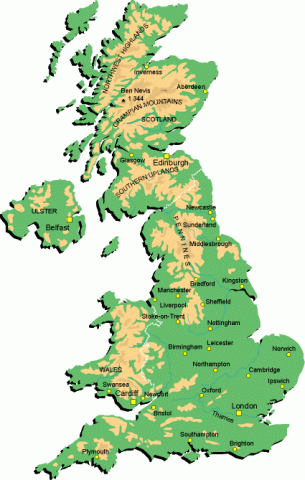Gold has been found in the UK for millennia, and was a key factor in the Roman Empire’s expansion into Britain.
Alluvial gold – the flecks and small nuggets found in Britain’s rivers.
Gold can be found in all four countries of the UK.
England –Lake District, the Pennines, the Forest of Dean and Cornwall . Hopes,Nose,Torquay,Devon.The Omagh gold deposit (originally called Lack and then Cavanacaw) is about 5 km WSW of Omagh in County Tyrone.
The Devon County area is one search area that offers a good chance of some success.
However, the finding of gold deposits in Camborne has raised the areas profile as a popular gold prospecting area in England.Many of the rivers in Cornwall are said to be rich in gold deposits. In particular, the rivers in North and West of Cornwall are good areas to begin the search for gold
Scotland – In Scotland, gold can be found in the Lowther Hills around Wanlockhead and in Leadhills. Dumfries and Galloway (the origins of the Douglas Nugget as mentioned above).Other areas include Mennock and the Kildonan Area near Helmsdale.
Wales – The Welsh Gold Rush of the 1860s is long gone, but the Dolgellau Gold Belt in Snowdonia still yields gold to this day. The ancient Dolaucothi Gold Mines in Camarthenshire also offer visitors a chance to try panning with supervision, and the Parys Mountain in north-east Anglesey is currently being considere for a mining site. Clwydian Hills: a series of small trial workings on irregular quartz veins in Silurian turbidites .Castell Carn Dochan Mine, Llanuwchllyn, Bala, Gwynedd. Berwyn Hills, Clwyd. Dolgellau Gold-belt, Gwynedd: this highly-important gold-producing area stretches from the Cardigan Bay coast near Barmouth in the SW around the south and east flanks of the Harlech Horst up to Cwm Prysor near Trawsfynydd in the NE.Treffgarne, Pembrokeshire.Snowdonia, Gwynedd.
Republic of Ireland – With a name like ‘Gold Mines River’ its unsurprising that this area in County Wicklow is a popular location for Irish gold hunters.The Clontibret deposit in County Monaghan on the border between Northern Ireland and the Republic of Ireland.
Gold prospecting UK.
The locations above are known sites that still regularly produce gold, but the UK has miles of untapped countryside that has never even been prospected. Just because gold hasn’t been found there yet should not be taken to mean it doesn’t exist there. Prospectors are understandably secretive when they find a good spot, and many take prime panning locations to their graves.
Before you set out on your first panning expedition there are some legalities to consider. First and foremost, you must ask permission from landowners before panning. A river at the bottom of a farmer’s field or country estate is still part of their property and accessing the land and removing gold should only be done with their agreement. They may also want a share of any profits made, and as the owner this is their right.
In Ireland “recreational panning” – using hand-held, non-motorised equipment, is allowed but the gold is still owned by the state. Selling the gold gathered is considered ‘working’ of minerals and requires permission by the Irish Government.

